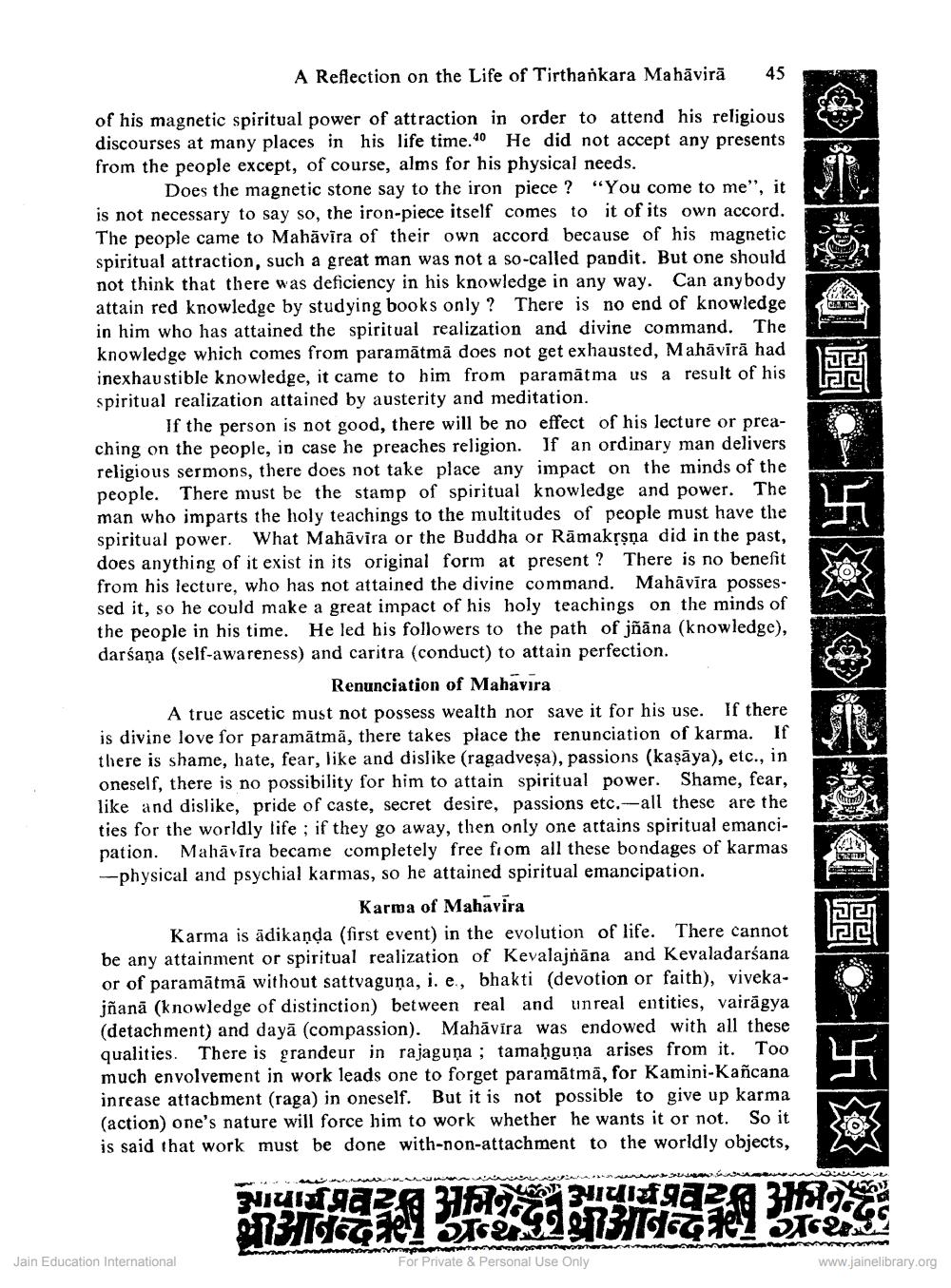Book Title: Reflection on the Life of Mahavira Author(s): J C Sikdar Publisher: Z_Anandrushi_Abhinandan_Granth_012013.pdf View full book textPage 9
________________ A Reflection on the Life of Tirthankara Mahāvirā 45 tec of his magnetic spiritual power of attraction in order to attend his religious discourses at many places in his life time.40 He did not accept any presents from the people except, of course, alms for his physical needs. Does the magnetic stone say to the iron piece? "You come to me", it is not necessary to say so, the iron-piece itself comes to it of its own accord. The people came to Mahāvīra of their own accord because of his magnetic spiritual attraction, such a great man was not a so-called pandit. But one should not think that there was deficiency in his knowledge in any way. Can anybody attain red knowledge by studying books only? There is no end of knowledge in him who has attained the spiritual realization and divine command. The knowledge which comes from paramātmā does not get exhausted, Mahāvīrā had inexhaustible knowledge, it came to him from paramātma us a result of his spiritual realization attained by austerity and meditation. If the person is not good, there will be no effect of his lecture or preaching on the people, in case he preaches religion. If an ordinary man delivers religious sermons, there does not take place any impact on the minds of the people. There must be the stamp of spiritual knowledge and power. The man who imparts the holy teachings to the multitudes of people must have the spiritual power. What Mahavira or the Buddha or Rāmakrsna did in the past, does anything of it exist in its original form at present? There is no benefit from his lecture, who has not attained the divine command. Mahāvīra possessed it, so he could make a great impact of his holy teachings on the minds of the people in his time. He led his followers to the path of jñāna (knowledge), darśana (self-awareness) and caritra (conduct) to attain perfection. Renunciation of Mahavira A true ascetic must not possess wealth nor save it for his use. If there is divine love for paramātmā, there takes place the renunciation of karma. If there is shame, hate, fear, like and dislike (ragadveșa), passions (kaşāya), etc., in oneself, there is no possibility for him to attain spiritual power. Shame, fear, like and dislike, pride of caste, secret desire, passions etc.--all these are the ties for the worldly life ; if they go away, then only one attains spiritual emancipation. Mahāvīra became completely free from all these bondages of karmas -physical and psychial karmas, so he attained spiritual emancipation. Karma of Mahavira Karma is ādikanda (first event) in the evolution of life. There cannot be any attainment or spiritual realization of Kevalajñāna and Kevaladarśana or of paramātmā without sattvaguņa, i. e., bhakti (devotion or faith), vivekajñanā (knowledge of distinction between real and unreal entities, vairāgya (detachment) and dayā (compassion). Mahāvira was endowed with all these qualities. There is grandeur in rajaguņa ; tamahguņa arises from it. Too much envolvement in work leads one to forget paramātmā, for Kamini-Kancana inrease attachment (raga) in oneself. But it is not possible to give up karma (action) one's nature will force him to work whether he wants it or not. So it is said that work must be done with-non-attachment to the worldly objects, Bunad2 E ldiga23 01/10 STAT913TGEA 515245 Jain Education International For Private & Personal Use Only www.jainelibrary.orgPage Navigation
1 ... 7 8 9 10 11 12 13 14 15
